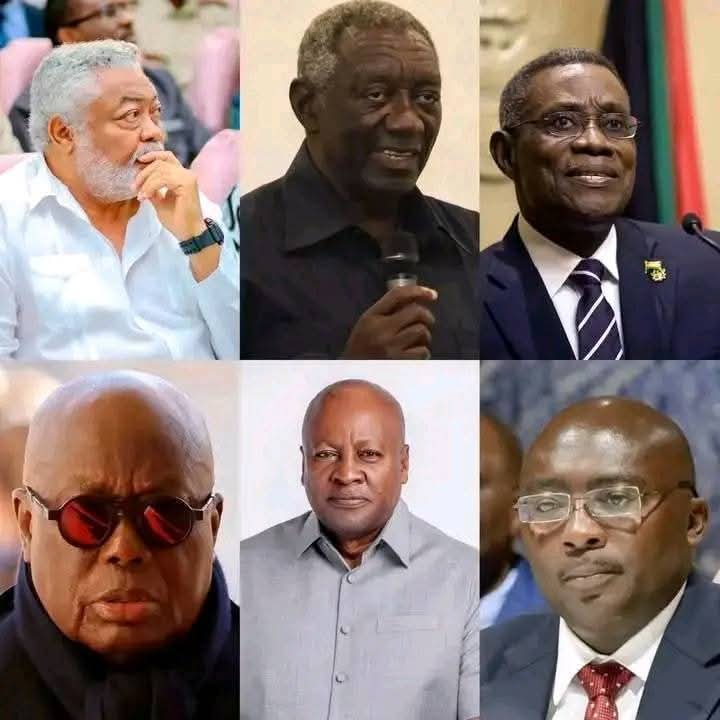Ghana’s presidential election results: A look at 1996 to 2024
Since the return of multi-party democracy in 1992, Ghana has held a series of presidential elections that have shaped its political landscape. From 1996 to 2024, the nation witnessed intense competition, shifting political allegiances, and a changing electorate that reflected the dynamic nature of the country’s political system. This feature story takes a closer look at the key results of Ghana’s presidential elections over the last three decades and the political shifts that have occurred during this time.
1996: Rawlings vs. Kufuor – A contest for continuity and change
The 1996 elections were crucial in cementing the democratic journey of Ghana. Incumbent President Jerry John Rawlings, representing the National Democratic Congress (NDC), faced a stiff challenge from John Agyekum Kufuor of the New Patriotic Party (NPP). Rawlings, who had ruled Ghana since 1981, secured a decisive victory with 57.37% of the vote, while Kufuor, in his first presidential run, garnered 39.67%. The result reinforced Rawlings’ grip on power, but it also marked the emergence of a formidable opposition leader in Kufuor, who would go on to shape the political future of the country.
2000: Kufuor’s rise – The beginning of a new era
The year 2000 was historic as it marked the first peaceful transition of power from one democratically elected president to another. After years of Rawlings’ leadership, Ghanaian voters chose John Agyekum Kufuor in a tight contest against the then vice president, Prof. John Evans Atta Mills of the NDC. Kufuor won with 56.9% of the vote, while Mills secured 43.1%. Kufuor’s victory was a sign of the NPP’s growing influence, particularly in the Ashanti Region, and was hailed as a key milestone in Ghana’s democratic consolidation. His victory was a testament to the electorate’s desire for change after nearly two decades under Rawlings.
2004: Kufuor’s re-election – A solidification of power
In 2004, Kufuor secured a second term with a victory that signaled his political dominance. He won 52.4% of the vote, while Mills, his main rival, garnered 44.64%. Despite the NPP’s strong economic performance during Kufuor’s first term, the race was close, and it highlighted the continued political polarization between the two major parties, the NPP and NDC. Kufuor’s reelection cemented his status as a major political force, and his government continued to implement policies that contributed to Ghana’s economic growth during the 2000s.
2008: Mills’ first win – A narrow victory
In 2008, Prof. John Evans Atta Mills made a dramatic comeback. After narrowly losing to Kufuor in 2000 and 2004, Mills defeated Kufuor’s successor, Nana Akufo-Addo, in a tight race. Mills won by a razor-thin margin of 50.23%, while Akufo-Addo secured 49.77%. The election results reflected the deep political divisions in the country, with Mills’ victory seen as a triumph for the NDC after years of opposition. Mills’ win was considered a significant milestone, as it demonstrated the resilience of Ghana’s democracy in peacefully resolving political competition.
2012: Mahama’s unexpected victory
In 2012, following the sudden death of President Mills, Vice President John Dramani Mahama assumed office. He contested the presidency in his own right and narrowly won the election with 50.70% of the vote, defeating Nana Akufo-Addo, who received 47.7%. Mahama’s victory came under challenging circumstances, as he inherited the mantle of leadership in the midst of national mourning and an economy facing challenges. Despite these obstacles, Mahama managed to secure a narrow win, continuing the NDC’s hold on power.
2016: Akufo-Addo’s comeback – NPP returns to power
The 2016 elections marked a decisive shift in Ghana’s political landscape. Nana Akufo-Addo, after two unsuccessful bids, defeated the incumbent president, John Dramani Mahama. Akufo-Addo’s NPP won 53.72% of the vote, while Mahama’s NDC secured 44.53%. This marked a significant moment in Ghana’s political history, as it demonstrated the electorate’s desire for change once again. Akufo-Addo’s victory was seen as a response to growing concerns about corruption and economic challenges during Mahama’s administration.
2020: Akufo-Addo’s second term – maintaining control
In 2020, Akufo-Addo won a second term, but his victory was much narrower than in 2016. The election results were 50.4% for Akufo-Addo and 46.4% for Mahama. The race was fiercely contested, with the NDC accusing the NPP of electoral malpractices. Despite the challenges of the COVID-19 pandemic, Akufo-Addo secured a second term, allowing the NPP to maintain its hold on power. Akufo-Addo’s reelection was driven by promises to continue his economic reforms and infrastructure projects.
2024: Mahama’s return – A new battle for the presidency
In 2024, Ghana’s political stage was set for another dramatic shift. John Dramani Mahama, who had already served one term as president, faced off against Vice President Mahamudu Bawumia. Mahama, representing the NDC, achieved a commanding victory, securing 57.7% of the vote, while Bawumia, from the NPP, garnered 38.2%. This marked a dramatic return for Mahama, whose strong showing reflected a desire for change after a challenging second term under Akufo-Addo’s leadership. Mahama’s win pointed to a possible shift in the political landscape, as Ghanaians voiced their desire for fresh leadership amid growing economic concerns.
A democracy in motion
The trajectory of Ghana’s presidential elections from 1996 to 2024 showcases the country’s evolving political landscape. From Rawlings’ long reign to the rise of Kufuor, Mills, Mahama, and Akufo-Addo, the results have reflected a complex mix of continuity and change. Voter preferences have swung between the two major political parties, the NPP and NDC, reflecting the dynamic nature of Ghana’s democracy. Each election cycle has brought its own set of challenges, but the peaceful transitions of power, especially in the face of fierce political competition, have underscored Ghana’s commitment to democratic governance.
As Ghana moves forward into the future, the political scene remains fluid, with elections continuing to reflect the aspirations of the Ghanaian people. The 2024 election results represent not only a return to power for Mahama but also a reminder of the enduring power of democracy in one of Africa’s most stable and thriving nations.






















































